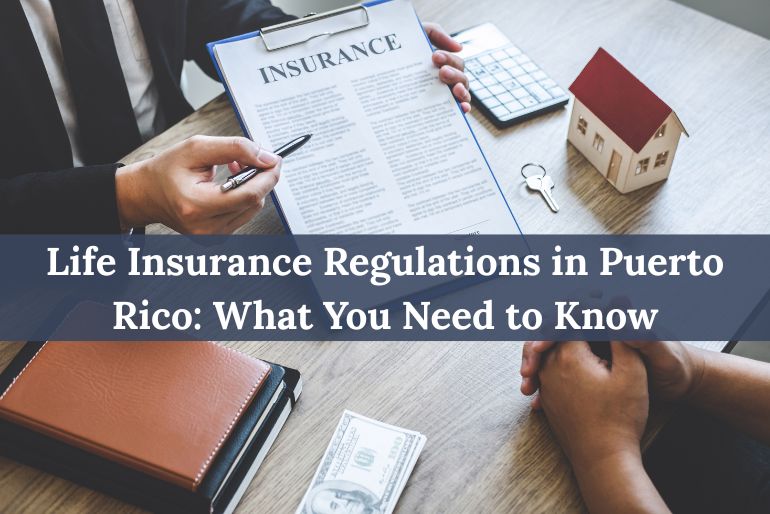
Life insurance is important for safeguarding your family’s financial future, not merely for piece of mind. But here’s something most Puerto Ricans don’t realize: the laws and regulations governing life insurance in Puerto Rico are not identical to those in the mainland U.S.
That means your rights, your taxes, and even how your beneficiaries receive money may look different depending on where you live. If you’ve been paying premiums for years, the last thing you want is to discover a hidden rule that reduces or delays your family’s payout.
In this blog, I’ll walk you through Puerto Rico’s life insurance regulations, explain how they impact you, and share smart strategies to protect your wealth. By the end, you’ll understand your rights, the pitfalls to avoid, and how to use life insurance as part of your broader retirement and estate plan.
Table of Contents
Toggle
How Is Life Insurance Regulated in Puerto Rico?
In Puerto Rico, the Office of the Commissioner of Insurance (OCI) oversees all life insurance providers and policies. Consider the OCI as the watchdog that makes sure businesses stay solvent and abide by the law.
Puerto Rico also has its own Insurance Code, which means that while many U.S. insurance principles apply, there are important differences. For example, consumer protections like grace periods, incontestability, and guaranteed rights for beneficiaries may be applied differently here.
Why this matters: If you’ve moved from the mainland or own policies across jurisdictions, you need to understand both sets of rules to avoid double taxation or missed benefits.
(Stat insight: The Puerto Rico insurance industry reported more than $12 billion in premiums in 2022, making it one of the island’s largest financial sectors. Source: NAIC)
What Types of Life Insurance Are Recognized by Puerto Rican Law?
Puerto Rican regulations recognize most of the same life insurance structures you see in the U.S., but with their own local adaptations:
- Term Life Insurance: offers protection for a predetermined amount of time (10, 20, 30 years). Regulations require clear disclosure about when coverage ends and how renewals work.
- Whole Life and Universal Life Insurance: Includes a cash value component. In Puerto Rico, this cash value is legally recognized as an asset that can play a role in estate planning.
- Group Policies: Employers often provide group life insurance. Puerto Rican labor laws regulate the minimum standards for employer-based coverage.
- Hybrid Policies and Riders: Many insurers now offer life insurance with riders, such as long-term care coverage. To shield policyholders from unjust contract terms, the OCI must approve these riders.
If you’re comparing policies, it’s important to look beyond premiums and benefits — understand how Puerto Rican law protects (or limits) each type of policy.
Consumer Protection: What Rights Do Policyholders Have?
One of the strongest features of Puerto Rico’s life insurance system is consumer protection. Here are key rights you should know:
- Grace Period: If you miss a premium, insurers must give you a legally mandated grace period (usually 30 days) before canceling your policy.
- Incontestability Clause: After two years, your insurer cannot cancel your policy for misstatements on the application (unless fraud is proven).
- Free-Look Period: Customers usually have 10 to 15 days to study a policy and cancel without incurring penalties.
- Beneficiary Protections: Puerto Rican law ensures that designated beneficiaries receive death benefits directly, bypassing probate in most cases.
Why it matters: These protections mean your family is less likely to face disputes or delays when accessing funds.
How Are Premiums and Payouts Taxed in Puerto Rico?
The area where Puerto Rico differs from the US the most is in taxes.
- Premiums: In Puerto Rico, life insurance premiums are typically not tax deductible, in contrast to several other U.S. states.
- Death Benefits: Typically, death benefits are not taxable under Puerto Rico’s Internal Revenue Code, making them a powerful estate planning tool.
- Cash Value Growth: Growth inside whole or universal life policies may be treated differently under Puerto Rico’s tax system compared to federal IRS rules.
Strategy tip: Many retirees in Puerto Rico use life insurance as a tax-efficient wealth transfer tool because payouts are generally shielded from local taxation.
What Happens If an Insurance Company Fails in Puerto Rico?
It’s rare, but what if your insurer goes bankrupt?
Puerto Rico has the Life & Disability Insurance Guaranty Association, which protects policyholders if an insurer becomes insolvent. Coverage limits vary, but this system ensures that families don’t lose everything due to company mismanagement.
This safety net is one reason to always verify that your insurer is licensed and regulated locally.
Beneficiary Rules in Puerto Rico
Naming a beneficiary sounds simple — but Puerto Rico’s community property laws can complicate things.
- Spousal Rights: If you’re married, your spouse may have legal claims to a portion of the benefit, even if you name someone else as beneficiary.
- Minors: Benefits left to minors must usually be managed by a legal guardian or trust until the child reaches adulthood.
- Trusts: Many Puerto Rican families use trusts to ensure smoother transfers of life insurance benefits.
Lesson: To prevent disagreements, always match your estate plan with your beneficiary selections.
Estate Planning and Life Insurance Regulations
Puerto Rico’s estate planning is different from that of the mainland. For example, the forced heirship rules mean you can’t always leave assets to whomever you choose.
But here’s where life insurance shines: death benefits often bypass probate and can be used to balance inheritance requirements.
That’s why many families work with estate planning consultants in Puerto Rico to integrate life insurance into a holistic legacy strategy.
Special Rules for Group Life Insurance
If you get life insurance through your employer, Puerto Rican law imposes minimum standards:
- Employers must clearly disclose terms and benefits.
- Group life policies are portable in many cases, meaning you may be able to continue coverage after leaving a job.
- Some employer plans in Puerto Rico also include accidental death and dismemberment riders by law.
This makes group coverage a valuable but often overlooked benefit.
Common Misconceptions About Puerto Rico Life Insurance
- Myth 1: All benefits are tax-free. While most are, some cash-value withdrawals may face tax treatment.
- Myth 2: You can name anyone as beneficiary. Community property rules may limit this freedom.
Myth 3: U.S. and Puerto Rican regulations are identical. In reality, local laws create unique advantages and pitfalls.
Useful Advice for Selecting the Best Policy in Puerto Rico
When shopping for coverage:
- Always confirm your insurer is licensed by the Office of the Commissioner of Insurance.
- Read the policy summary — Puerto Rican law requires insurers to disclose all fees and conditions.
- Work with a licensed life insurance advisor in Puerto Rico who understands both the local rules and your family’s needs.
Review policies regularly, especially if you experience life changes like marriage, divorce, or starting a business.
Case Study: A Puerto Rican Family Navigating Regulations
Consider Ana, a widow in Bayamón whose husband passed away with both a local life insurance policy and a U.S.-based one. Because she didn’t understand the rules, she initially faced delays and tax complications with the U.S. policy.
By contrast, the Puerto Rican policy paid out smoothly, tax-free, and directly to her as the beneficiary. The lesson? Adapt your insurance strategy to Puerto Rico’s laws to prevent stress and unforeseen expenses.
Puerto Rico Annuity Advisor: Is It Worth It?
While this blog focuses on life insurance, many Puerto Rican retirees also explore annuities as a complement. Like life insurance, annuities are regulated under Puerto Rico law and can provide guaranteed income.
However, not all annuities are created equal. Some carry hidden fees or restrictions. This is where working with a top retirement planning advisor in Puerto Rico can make all the difference. They’ll evaluate whether an annuity fits your retirement strategy and ensure you don’t fall into common traps.
Conclusion: Protect Your Family With the Right Knowledge
Life insurance in Puerto Rico isn’t just about buying a policy — it’s about understanding the laws and protections that shape how those benefits work. From consumer rights and beneficiary rules to estate planning and tax treatment, knowing the regulations empowers you to make smarter decisions.
If you want to protect your loved ones and maximize your legacy, the smartest step is to work with the best financial advisors in Puerto Rico. They’ll help you align policies with your estate plan, reduce taxes, and ensure your family is secure.
And when it comes to navigating these regulations, choosing the right partner matters. That’s why working with a trusted life insurance consulting firm in Puerto Rico can make the difference between a smooth payout and costly surprises.
Your family deserves security. With the right knowledge — and the right guidance — you can guarantee it.


